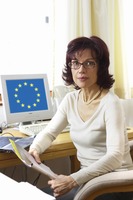 She was born on July 2, 1942. In 1965, graduated Ljubljana Law School, and in 1973 finished Masters’ Degree in Law (international law and international relations) at the Law School of the University of Zagreb.
She was born on July 2, 1942. In 1965, graduated Ljubljana Law School, and in 1973 finished Masters’ Degree in Law (international law and international relations) at the Law School of the University of Zagreb.
While still a student, she began work at the national radio station in Ljubljana, where she continued to work for the next ten years with a short interruption while employed at the maritime company, Port of Koper. By the end of the politically turbulent sixties, she was regularly publishing articles, analysing international politic events, and indirectly commenting on internal politics. During this same period, she was also working as a reporter and columnist for several Slovene newspapers. After briefly working with the Faculty of Social Sciences, she became a foreign correspondent for the national Slovene newspaper DELO, assigned first to Bonn (from 1978 to1982), later to Rome (from 1989 to 1993), and finally to Vienna (from 1997 to 2003). The side effect of articles advocating human rights, ethical public discourse, independence of judiciary and democratisation of then authoritarian regime was that she began to act indirectly at the brink of the politics. This happened during the period of so called Slovenian liberalism at the end of seventies, but also in the second half of eighties, during the disintegration of Yugoslavia and the birth of alternative movements, as well as after Slovenian independence.
In the eighties she became active in the Association of Slovene Journalists and contributed to developing the code of conduct for the journalists.
As a consequence of the work in the civil society, colleagues journalists took a chance and nominated her as their candidate for the (indirect) presidential elections in 1988. The elections aroused big public attention and this has eventually helped to bring about the first free presidential elections in Slovenia a year or so later, which won Janez Drnovšek.
After the independence, pro-European convictions led her to writing about the international foundations of the new state, international politics and the status of Slovene minorities in the neighbouring states and she was committed to the integration of Slovenia into the European Union. She was elected in the 2004 on the list of the Liberal Democracy of Slovenia party for the first elections to the European Parliament.